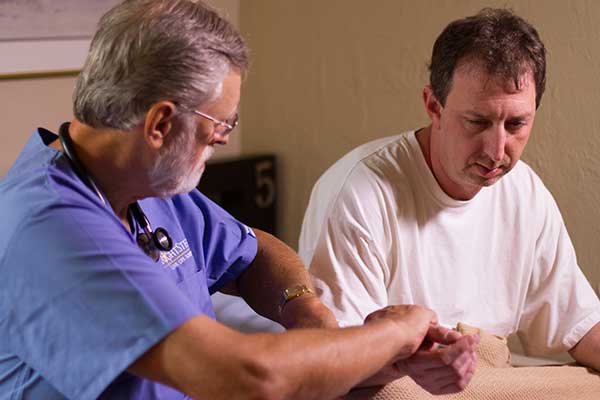Watching a loved one struggle with addiction can be heartbreaking, terrifying and infuriating. I’ve been there. It’s one of the reasons I chose to work in addiction and mental health treatment. If you’re not sure how to deal with a loved one’s addiction, here are a few suggestions:
Don’t Enable
Enabling is very common with loved ones of drug addicts. You’re trying your best to help, but may not know how to do so effectively. Enabling is doing for someone what they can do for themselves. Families enable addiction in ways like providing financial support, bailing them out of trouble or making up excuses for them. You think you’re helping your loved one get better or stay safe by providing resources, but you’re really enabling their destructive behaviors. Addiction is a disease that lives in the survival part of the brain. It hijacks the reward system that is built to reinforce survival behaviors like eating and procreation, making the addicted brain believe it must have the substance to survive. The addict’s main priority is their substance of abuse and they will do whatever it takes to meet this perceived need. This includes lying, stealing and manipulating. They’re some of the smartest and most creative people I know. They work their family members and are very successful at it. That’s why it’s so important to not enable by setting appropriate boundaries. Not enabling means refusing to participate in your loved one’s addiction, but being open and willing to participate in their recovery. It means you don’t put the addict’s needs above your own. Addicted people can be crafty. They often have a way of making their own wants seem like needs. They can create a crisis or make it appear that you’re being hateful or mean by not providing them what they want. Unfortunately, when active in addiction, what they want is the very thing that is killing them.
Set Boundaries
Boundaries are difficult to enforce with your addicted loved one, but they’re absolutely necessary. One of the best ways to do this is to separate the addict from the addiction. It may make it a little bit easier to set boundaries if you say to yourself, or even out loud to your loved one, “I’m doing this because I love you, and I hate your addiction.” Realize that by enabling your loved one, you’re actually helping to keep them addicted. Setting boundaries is the best way to help them help themselves. Common boundaries loved ones of drug addicts may set include:
- Not providing financial support
- Not providing housing
- Not lying or covering up for them
- Not helping them if they get into legal or financial trouble
- Not allowing them to attend family events
The specifics of boundaries will be different for every family learning how to deal with a loved one’s addiction. For instance, maybe you won’t provide financial support for your loved one if they’re using, but you’ll fund sober living or help pay for residential addiction treatment. Perhaps you’ll help with their phone bill or transportation as long as they’re consistently attending 12-step groups and therapy. Make sure you include all of these details in writing. Have them review it and sign it.
Be Direct and Consistent
It’s important to be direct about boundaries. There can’t be any wiggle room or gray area. Have clear expectations and have it in writing. This way there’s no question about what you discussed or how your loved one interprets it versus how you meant it. Whether or not the addict agrees or remembers the conversation is irrelevant. It’s up to the loved ones of drug addicts to enforce boundaries and be consistent. Be upfront and honest. Do not minimize or tread lightly. The addict is hijacked by their addiction. They don’t necessarily see what seems so obvious to someone looking in from the outside. You need to spell it out. If you allow them to cross a boundary once it’s sending the message that it’s okay. For example, if you say they can’t come to family events when using and you let them come to family dinner high, you’re telling them that behavior is acceptable. It’s hard to get your footing again once they’ve broken a boundary, even once.
Get Them in Front of a Professional
It’s a misperception that an addict must want to get clean or treatment isn’t going to work. A lot of times that’s even what addicts tell people because they want to get out of going to treatment. Many of our clients entered addiction treatment because of legal problems, orders by Child Protective Services or ultimatums by loved ones. All of those reasons are completely valid motivators to initially get people into treatment. Our job as therapists is to help them find that internal motivation — to have that desire to get better for themselves. Whatever gets them in the door could potentially save their life. Getting your loved one into an addiction treatment facility for an assessment could be a game changer. The assessor’s primary job is to gather information about their physical and mental health, but more importantly, they can also convince them why drug rehab treatment is necessary. You may say something to your loved one like, “Let’s talk to a professional because I’m really concerned about you. Let’s just go see what they have to say.” If your loved one has ever been involved in any type of 12-step program like Alcoholics Anonymous (AA) or Narcotics Anonymous (NA), they can help. A sponsor or other group members often conduct interventions for members who’ve relapsed. They’ll work to get them into treatment.
Acknowledge How Difficult This Is
Any kind of change is difficult. A lot of loved ones of drug addicts get to a point where they’re just so angry, resentful and fed up, and they don’t come across in a loving way. You’d be surprised how much it helps to acknowledge that you realize this is tough for your loved one. Show that you genuinely love and care about them. It’s a struggle for the addict. Empathy, care and concern can go a long way. Break down their defenses so that they can get the help they need.
Remember, You Can’t Do the Work for Them
Unfortunately, there are some people who have strong defenses and aren’t yet willing to put the work into recovery. We know as clinicians we can’t work harder than they do. The same goes for loved ones. You can encourage them to get help, you can get them into drug rehab treatment, you can support them in sobriety — but not one of us can do the work for the addict as much as we want to.
Take Care of Yourself
Self-care is critical. Addiction is a family disease. Acknowledge you’re impacted in a lot of ways by your loved one’s substance abuse. Loved ones of drug addicts are often depleted emotionally and physically. Take care of yourself. Participate in individual therapy and support groups like Al-Anon. Take part in activities that nurture you, whether that be fitness, mindfulness, hobbies or other self-care activities. You must be healthy to help yourself and to be there for your loved one.






